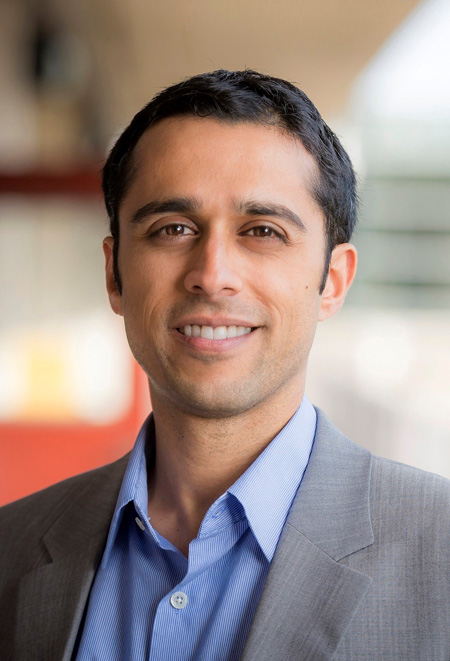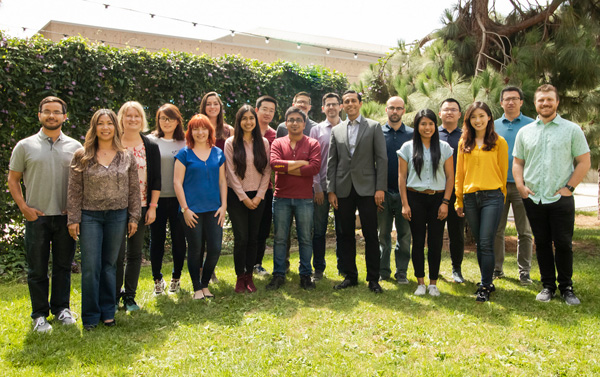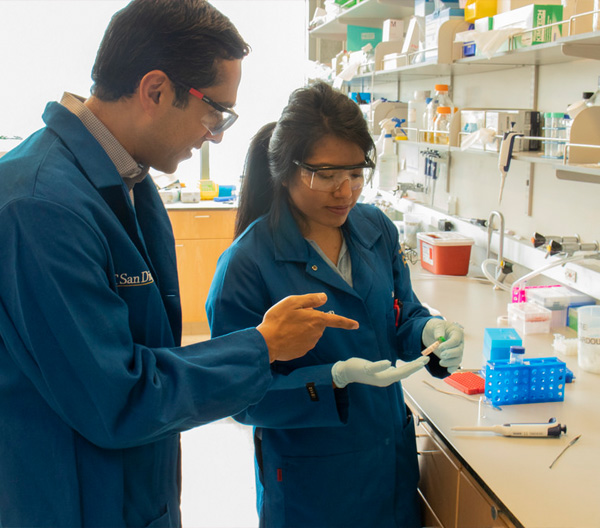UC San Diego Professor Named Blavatnik National Laureate in Chemistry
Researcher Neal Devaraj wins $250,000 for transformative work that could reveal secrets of life’s origins and lead to improved disease detection, treatment
Published Date
By:
- Cynthia Dillon
Share This:
Article Content

Neal Devaraj. Photo by Erik Jepsen, UC San Diego Publications
Scientists have long pondered how non-living materials coalesced into the earliest life forms on Earth. Nearly 60 years ago Stanley Miller and Harold Urey, founding professors of the physical sciences at the University of California San Diego, established a tradition of working to answer questions about life’s molecular origins. Professor Neal Devaraj continues that UC San Diego legacy by using chemistry to solve questions in biology, while also developing new tools that uniquely perform tasks within living cells. For his inventive work, the Blavatnik Family Foundation and the New York Academy of Sciences have announced Devaraj as the 2018 Blavatnik National Laureate in Chemistry.
As one of three outstanding 2018 Laureates of the Blavatnik National Awards for Young Scientists, Devaraj will receive $250,000—the largest unrestricted scientific prize offered to America’s most promising faculty-level scientific researchers aged 42 or younger. He will also receive an award medal and be honored at the Annual Blavatnik National Awards for Young Scientists Ceremony in September, which will be held in the American Museum of Natural History in New York City.
“Professor Devaraj has emerged as one of the world's most innovative and leading chemical biologists. The impact of his work is phenomenal and growing quickly,” noted Steven Boggs, dean of the Division of Physical Sciences at UC San Diego.
Devaraj’s work on the synthesis of artificial cells and membranes essentially created an exciting new field of research that aims to address challenges in synthetic biology. The new tools he created to label biomolecules are used by researchers globally. And one day his novel tests and therapeutics might apply to earlier disease detection and more effective treatments clinically. For his scientific efforts, Devaraj has earned numerous awards including the 2017 American Chemical Society Award in Pure Chemistry, the 2016 National Fresenius Award sponsored by Phi Lambda Upsilon and a 2016 Camille Dreyfus Teacher-Scholar Award.

Professor Devaraj pictured (center right) with his research group at UC San Diego. Photo by Michelle Fredricks
At the university, the Department of Chemistry and Biochemistry faculty member leads the Devaraj Research Group, comprised of several graduate students, postdoctoral fellows and undergraduates. His team has made several advances, including the development of artificial membranes that mimic a cell’s ability to reproduce continuously—a major breakthrough in science.
“Neal Devaraj is an outstanding chemical biologist of extraordinary depth, clarity and intuition who has shown independent thinking, contagious energy and effortless scholarship to develop and implement imaginative, novel and rigorous approaches to tackle challenging projects of increasing complexity at the cellular level,” said Dinshaw Patel, the Abby Rockefeller Mauze Chair in Experimental Therapeutics, Structural Biology Program, Memorial Sloan Kettering Cancer Center in New York, and a member of the 2018 Blavatnik National Awards Jury.

Neal Devaraj (left) with Judith Flores, a student researcher in the Devaraj Research Group. Photo by Michelle Fredricks
Devaraj explained that when approaching his research he considers the minimal chemistry from which biology can emerge. “When I observe a cell, I marvel at how complex sets of molecules can assemble to form a living organism. My lab is developing technologies to unveil the secrets of life’s origin while simultaneously improving our understanding of modern-day biochemistry.”
Nominated by 146 research institutions across 42 states, 286 nominees were narrowed to a pool of 31 Blavatnik National Finalists. UC San Diego affiliates held four of the finalist slots; two earned the title of laureate: Devaraj, in chemistry, and the Salk Institute for Biological Studies’ Janelle Ayres, in life sciences. Sergei Kalinin of the Oak Ridge National Laboratory won the Blavatnik award under the category of physical sciences and engineering.
The physical sciences are among the founding disciplines of UC San Diego, established in 1960. The first students to enroll at the university were graduate students in physics. Today, all three graduate programs in the Division of Physical Sciences—chemistry and biochemistry, physics and mathematics—are ranked among the top 20 according to U.S. News and World Report.
Share This:
You May Also Like
Stay in the Know
Keep up with all the latest from UC San Diego. Subscribe to the newsletter today.



